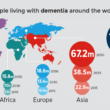Promising New Treatments for Alzheimer’s Disease
Research Advances and Potential Alzheimer’s Disease Treatments: A Beacon of Hope
Millions of people worldwide suffer from Alzheimer’s disease, a neurodegenerative condition that impairs memory and cognitive abilities. While the hunt for a cure rages on, new discoveries in the field of medicine provide glimmer of hope for possible therapies that can halt the disease’s progression and enhance the quality of life for those who suffer from Alzheimer’s.
Table of Contents

Exposing the Enigma: Focusing on Crucial Figures in Alzheimer’s
Promising New Treatments for Alzheimer’s Disease
Two key participants in the onset of Alzheimer’s disease have been discovered by researchers:
- The brain deposits: known as amyloid plaques are a defining characteristic of Alzheimer’s disease.
- Tangles of Tau: These aberrant build-ups of Tau, another protein, harm neurons and impair brain transmission.
Going after Amyloid Plaques:
Promising New Treatments for Alzheimer’s Disease
- Monoclonal Antibodies: Aducanumab and Lecanemab are two medications that have drawn a lot of interest. By binding to amyloid beta plaques, these antibodies aid in the removal of the plaques from the brain. Despite their FDA approval and promising first results, more research is needed to fully understand their long-term efficacy and possible adverse effects.
- Modifiers of the Beta-Amyloid Precursor Protein (AβPP): Scientists are investigating medications that control the generation of AβPP in an effort to stop amyloid plaques from ever forming.
Taking Aim at Tau Protein:
Promising New Treatments for Alzheimer’s Disease
- Tau Aggregation Inhibitors: These medications work to stop Tau proteins from forming toxic tangles by clumping together.
- Enhancers of Tau Clearance: Scientists are working on medications that will activate the brain’s natural processes to eliminate tau tangles, which may delay the onset of disease.
Beyond Amyloid and Tau: Other Research Paths
Promising New Treatments for Alzheimer’s Disease
Although treating tau tangles and amyloid plaques is still a major priority, research is also being done in other intriguing areas:
- Neuroinflammation: Alzheimer’s disease is thought to be exacerbated by long-term, low-grade inflammation in the brain. Anti-inflammatory medications have the ability to lower inflammation and maybe impede the course of disease.
- Lifestyle Interventions: Keeping up a healthy diet, exercising, doing cognitive training, and practicing excellent sleep hygiene can all have a positive effect on brain health and perhaps lower the risk of Alzheimer’s disease.
- The field of gene therapy: is a recent development that aims to prevent or treat Alzheimer’s disease by altering genes linked to the illness. Although research in this field is still in its infancy, there is a great deal of potential for the future.
- The Gut Microbiome: New research indicates a link between brain health and gut flora. Scientists are investigating how to modify the gut microbiota in order to potentially affect the course of Alzheimer’s disease.
Problems and Things to Take Into Account When Treating Alzheimer’s
Promising New Treatments for Alzheimer’s Disease
Even with the wonderful developments, there are still big obstacles to overcome:
- Blood-Brain Barrier: One of the challenges in properly administering medication across the brain’s protective gateway, the blood-brain barrier, is still present. To get over this obstacle and guarantee that medications reach their intended locations in the brain, researchers are formulating plans.
- Early Diagnosis and Detection: To optimise therapy efficacy, early intervention is essential. However, accurate biomarkers for Alzheimer’s disease in its early stages are still being discovered, which makes an early diagnosis challenging.
- Clinical Trials: Long-term, comprehensive studies including a sizable participant base are necessary to develop successful medicines. Furthermore, these trials can be quite costly, which impedes the advancement of research.
The Prospects for Alzheimer’s Therapy: A Justification for Hope
Promising New Treatments for Alzheimer’s Disease
Despite the fact that Alzheimer’s disease currently has no known cure, there is great cause for hope given the state of ongoing research. Numerous approaches are being actively investigated by researchers, opening the door for future therapies that might:
- Delay the disease’s progression: Patients’ quality of life can be greatly enhanced and their ability to remain independent for longer can be sustained by slowing the disease’s course.
- Enhance cognitive function: Alzheimer’s patients can live much better lives when they receive treatments that reduce symptoms like confusion and memory loss.
- Future prevention of Alzheimer’s: Determining the fundamental causes of Alzheimer’s is essential to creating preventative measures that eventually seek to stop the illness completely.
Keeping Up to Date and Involved:
Promising New Treatments for Alzheimer’s Disease
The field of Alzheimer’s research is always changing. To keep yourself informed about the most recent developments, check out these resources:
Alzheimer’s Disease Information from the National Institute on Ageing: https://www.nia.nih.gov/health/alzheimers-and-dementia
ClinicalTrials.gov: https://clinicaltrials.gov/ Alzheimer’s Association: https://www.alz.org/ (look up “Alzheimer’s disease” online)
We can all work together to combat Alzheimer’s and build a better future for those who are impacted by the illness by becoming aware of the current research initiatives and promising treatment options.


